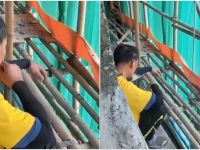Iraqi President Saddam Hussein said U.S. threats of military action against him played a role in his perfect 100 percent win in a referendum for another seven-year term in office.
In his first remarks on the result of Tuesday's presidential referendum, Saddam was quoted early on Thursday as telling his top aides the vote showed the world that the Iraqi leadership and people were one.
"Yes, the (U.S.) challenge played a role," the Iraqi News Agency quoted Saddam as telling the ruling Revolutionary Command Council at a meeting on Wednesday night.
"It was natural that Iraqis were put into a state of alert by the challenge...It was their chance to seize a historic opportunity to take a sincere stand," he said.
The Iraqi leader said the people had "declared to the whole world that it is at one with its leadership." Deputy Prime Minister Tareq Aziz told the meeting Iraqis had been insulted by repeated U.S. threats and a recent press report that Washington was considering appointing an American military ruler in Iraq if it toppled Saddam.
"The Iraqi does not accept insults," he said. "This American insistence created an unusual reaction among Iraqis...Every day they (Americans) repeat 'we want to attack Iraq'. The Iraqis are wondering 'what do they want from us?"'
U.N.
The United States came under harsh criticism Wednesday as the Security Council held an open debate on the Iraqi crisis.
Key U.S. allies in the Middle East, including came out against the use of military force in Iraq and called on Washington to give U.N. weapons inspectors a chance to disarm Saddam Hussein.
Iraq's other neighbors, from Iran to Jordan and the Persian Gulf states, warned that a military strike would further destabilize the volatile Middle East for years to come.
Even close friends such as Japan and Australia refrained from supporting America's attempts to win authorization in a new U.N. resolution for a military strike if inspections fail.
But U.N. Secretary-General Kofi Annan supported the U.S. search for a new resolution that would toughen weapons inspections and he urged Baghdad to use this "last chance." In a statement, Annan said Iraq's 11-year defiance of council resolutions posed "one of the gravest and most serious" challenges to the United Nations today.
"Iraq has to comply. It must implement the disarmament program required by your resolutions," he said. "The inspectors must have unfettered access" to suspected weapons sites, Annan said.
The U.S. ambassador is scheduled to address the council on Thursday. "If Iraq gains even greater destructive power, nations in the Middle East would face blackmail, intimidation or attack. Chaos in that region would be felt in Europe and beyond," President Bush said Wednesday as he signed a Congress resolution authorizing the use of force against Iraq. Bush warned that Baghdad would be "unwise" to doubt US resolve.
On his part, Iraq's U.N. Ambassador Mohammed al-Douri reiterated Baghdad's desire for a quick resumption of inspections and charged the United States with blocking their return in order to impose "American colonialism," and control the region's oil.
© 2002 Al Bawaba (www.albawaba.com)









